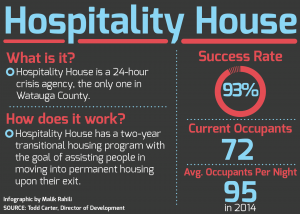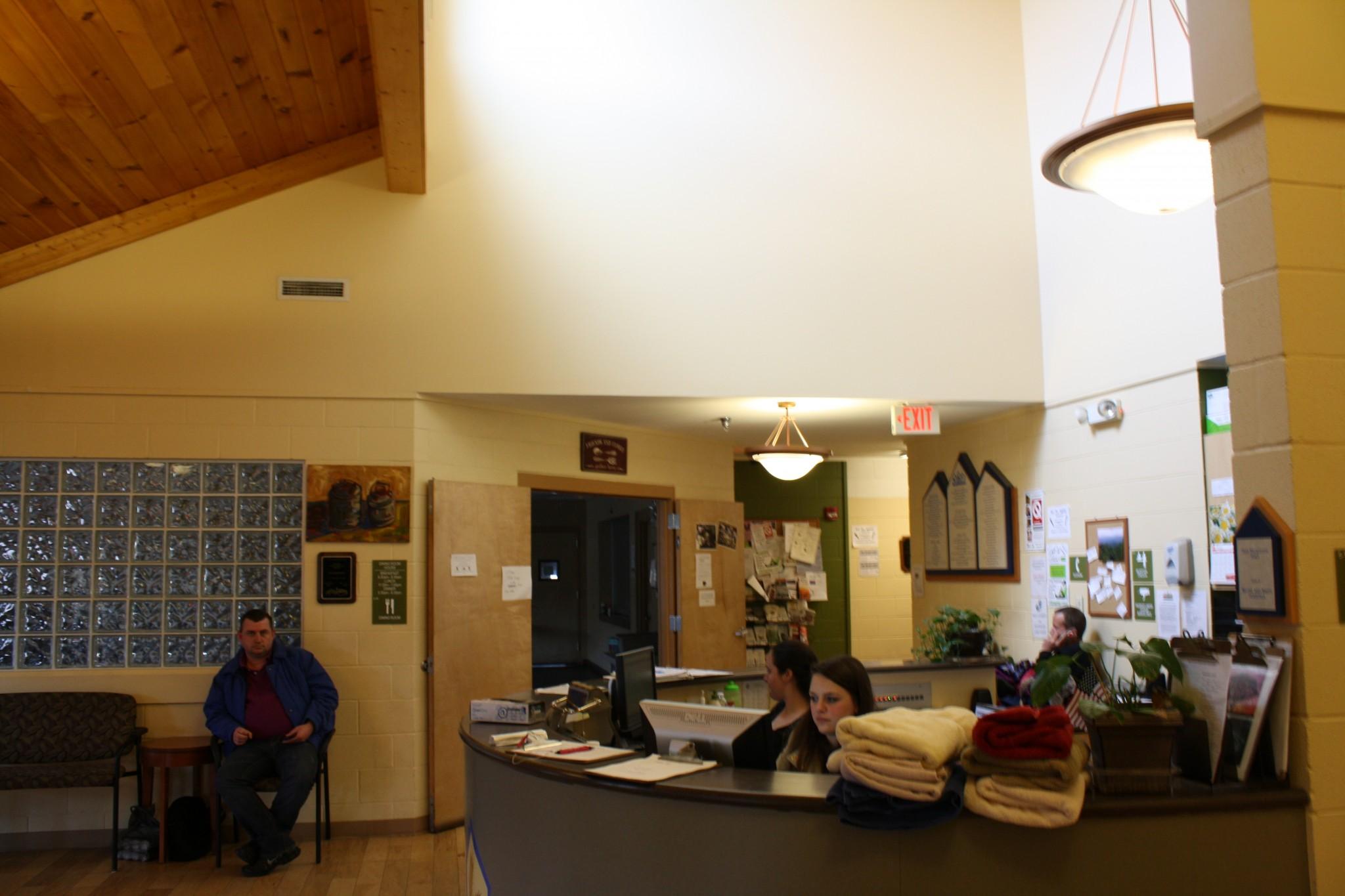In a bad economy, Hospitality House helps the homeless get back on their feet
As poverty and homelessness continue to affect Boone, the Hospitality House has been able to bring hope by providing shelter, support and aid for the people in the community.
The Hospitality House opened as a shelter for the homeless early in 1985. It is a living facility with the mission to help women, men and children get back on their feet during crisis, poverty and homelessness. The facility is roughly a 10-minute drive from Appalachian State University.
“We’re the only 24-hour crisis agency in the county, so we’re the last life line for a lot of people that have lost everything,” said Todd Carter, director of development at Hospitality House.

The facility is currently a home for 72 people that vary in age and circumstances for seeking shelter there. In 2014, the facility had about 95 people per night and an annual report in 2013 showed over 34,000 shelter nights were provided that year, Carter said.
The organization is unique because it not only provides shelter, food and clothing but also a number of programs designed to help people stand on their own after leaving the Hospitality House.
A safe, nurturing and healthy environment is provided using programs including the Watauga Crisis Assistance Network, Bread of Life Food Pantry, Rapid Housing, Scattered Site Housing, Rock Haven Independent Living Facility, Family Housing, Long-Term Transitional Housing and Emergency Shelter Services.
The Transitional Housing Program has a 93 percent success rate for people exiting Hospitality House with housing. It is a two-year program, but the average length of stay is 153 days, according to a statistics page provided by Carter.
“Everybody that I’ve seen come through here is down on their luck in some way, shape or form,” said Anna VanHart, a 31-year-old wife and mother of two kids living under the Transitional Housing program. “Most of us here are just in a rough spot in our life.”
VanHart has now been living at the Hospitality House for six months after losing her apartment.
“At times it is difficult raising my children here, even if it is for a short period of time,” VanHart said. “There are good people here, but [my children] have also learned tricks from them like high-fiving, fist pumping and picking up candy, and that gives me a hard time at meal time.”
Although the Hospitality House has a kids gardening program to teach them that food doesn’t just come out of cans, VanHart’s children are currently only enrolled in the daycare program.
“[Hospitality House] has helped us tremendously by providing us and our kids with a roof over our head, a chance to save money and with tools so that when we get out we’re ready,” VanHart said. “It is a really good place and they do a great job with helping you and your needs in numerous ways.”

Wayne Harris, a senior resident who has been living at Hospitality House for a couple of months and also under the Transitional Housing Program said health issues caused him to get laid off from work, which led him to be homeless for about a year.
“Hospitality House is a real nice place and I really couldn’t ask for a better place to live,” Harris said. “Being homeless is terrible, because you face going hungry and not having clothes to walk in everywhere you go. It’s just terrible and something I don’t want to go through anymore.”
Harris said a very helpful way for the surrounding community to help the homeless is by providing clothes and he wishes there were more job opportunities since the economy makes it hard for people to get a job, even if they want to work.
“I find motivation to eventually have my own home in the help that [Hospitality House] offers in teaching us how to save money and I like how they give us time to figure those things out,” Harris said.
Carter said homelessness can result from generational poverty, loss of a job and a lack of a full-time job. Many people who are homeless have a job, but it is hard to make a living when housing is $51,500 a year and the median annual income is $32,500.
People in the homeless community who have resided in the Hospitality House have included AppalCART bus drivers, an attendant at Staples, a barista, a chef and many more, Carter said.
“Everyone in this community comes across a homeless person and they don’t even know it,” Carter said. “Almost 60 percent of the people who live here have jobs, they just can’t afford to live because affordable housing is so bad and there are jobs, but 51 percent of all jobs in North Carolina are low waged jobs, designed to keep them.
STORY: Chamian Cruz, News Reporter
PHOTO: Alan Beauvais, Intern Photographer
INFOGRAPHIC: Malik Rahili, Visual Managing Editor

Felicia Daniels • Mar 25, 2015 at 3:55 pm
I’m the barista! Hos House helped us thru a rough patch, but I am glad to say we finally got thru it and are making it fine in our own!
Felicia Daniels • Mar 25, 2015 at 3:57 pm
*on our own